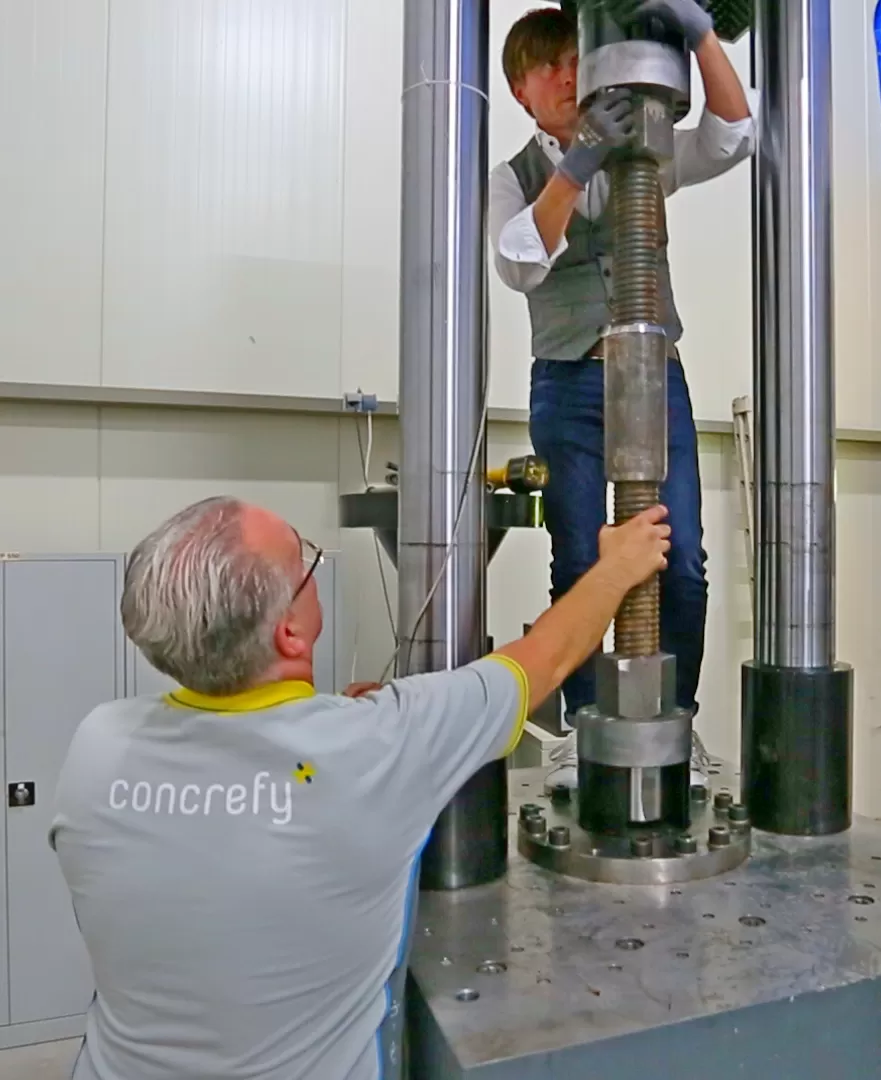Testing mechanical splices and headed bars
Concrefy is specialised in testing reinforcement couplers for mechanical splices of bars according to various international standards and for various types of projects.
For mechanical splices for reinforcement steel and headed bars, many international standards are available, setting different requirements and prescribing very specific tests.
Our laboratory belongs to a selection of laboratories worldwide that are able to carry out these tests. We carry out these tests for manufacturers of these coupling systems, but also for contractors and other users of these products. Based on static, dynamic and cyclic loading tests, we assess whether the products meet all the requirements for use in bridges, viaducts, power stations, dams, high-rise buildings or stadiums.
Benefits
- Wide experience in international regulations and standards
- High-tech testing machines with capacity up to 1200 kN for tension tests (rebar diameters up to 40 mm)
- Fatigue tests are conducted with high frequency pulsator test machines (one fatigue test takes only eight hours while hydraulic machines need an entire week for this test)
- Accreditation for most common tests
- You receive your test reports a few days after delivery of the samples. We care about your deadlines
Tests and standards
When ISO 15835 tests have to be carried out, a combination of slip measurements with tensile tests, fatigue tests and low-cycle loading tests is often required. We routinely carry out these tests with a 1200 kN tensile and compression test machine (up to 40 mm bar diameter) and because we have high frequency pulsators (HFP) instead of hydraulic fatigue machines, a sample fatigue test takes only eight hours while hydraulic machines need an entire week for this test.
Possible tests on couplers & headed bars:
- ISO 15835: slip, tension, fatigue and low cycle tension and compression tests
- ISO 15698-2: tensile, wedge tensile test, high cycle fatigue, low cycle tension tests
- ACI 359-01: tension, tension at -7°C, and cyclic tension tests (100 cycles)
- AC133: static tension, static compression and cyclic tension and compression tests
- TUC Rail 30.2: slip, tension, fatigue tests
- NSW – SF2013/184115: slip, tension, fatigue tests
- IS 16172: slip, tension, cyclic tensile test, high cycle fatigue tests
- BS 8597: slip, tension, high cycle fatigue tests
- Cares TA1-B: slip, tension tests
- Cares TA1-C: slip, tension, compression, cyclic tension tests (100 cycles)
- NF A35-020-2-1: slip, tension, fatigue and low cycle tension and compression tests
- NF A35-020-2-2: slip, tension, fatigue and low cycle tension tests

Former projects
The tests to be carried out on mechanical splices depend on the type of construction, the country and the risk of earthquakes at the location where the construction is being built. Please find below some of the projects for which Concrefy has tested mechanical splices, with reference to the standards and type of tests.
- Bridge Panama channel; low-frequency cyclic testing in accordance with CALTRANS CT 670
- Nuclear power plant USA; low-frequency cyclic testing in accordance with ACI 359-01
- Bridge Bosphorus Istanbul; low-frequency cyclic tests (S2) in accordance with ISO 15835
- Montenegro highway; high and low frequency cyclic testing (S2) in accordance with ISO 15835
- Railway bridge Belgium; slip and tensile tests and high-frequency cyclic tests in accordance with TUC Rail 30.2
- Hinkley nuclear power plant UK; testing at headed bars in accordance with ISO 15698
- Cairo Metro; high and low frequency cyclic testing (S2)in accordance with ISO 15835
- One Tower Cyprus; high and low frequency cyclic testing (S2) in accordance with ISO 15835
- Ayia Napa Marina Cyprus; high and low frequency cyclic testing (S2) in accordance with ISO 15835
- Melbourne Metro; slip and tensile testing and high-frequency cyclic testing in accordance with NSW Government – SF2013/184115
Discuss your Metal Testing needs with us!
“We always try to exceed customer expectations. We know our customers and understand their urgency for having test results available quickly. Our short lines of communication with the customer and our focus on getting the job done ensure that you, as a customer, can rely on us. Please contact me for more information.”

Peter Megens
Project Manager metal testing
T +31 77 8507 227

